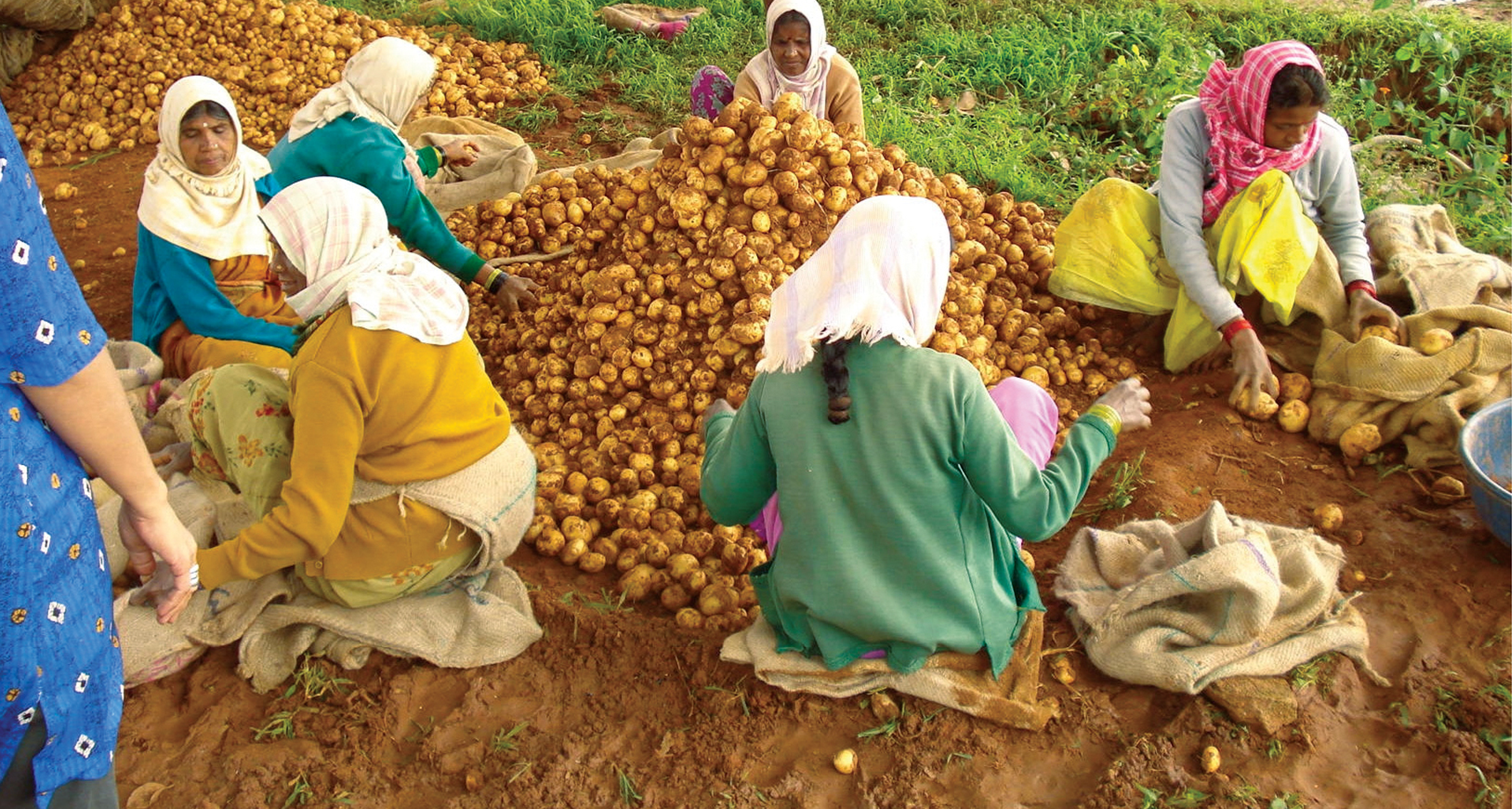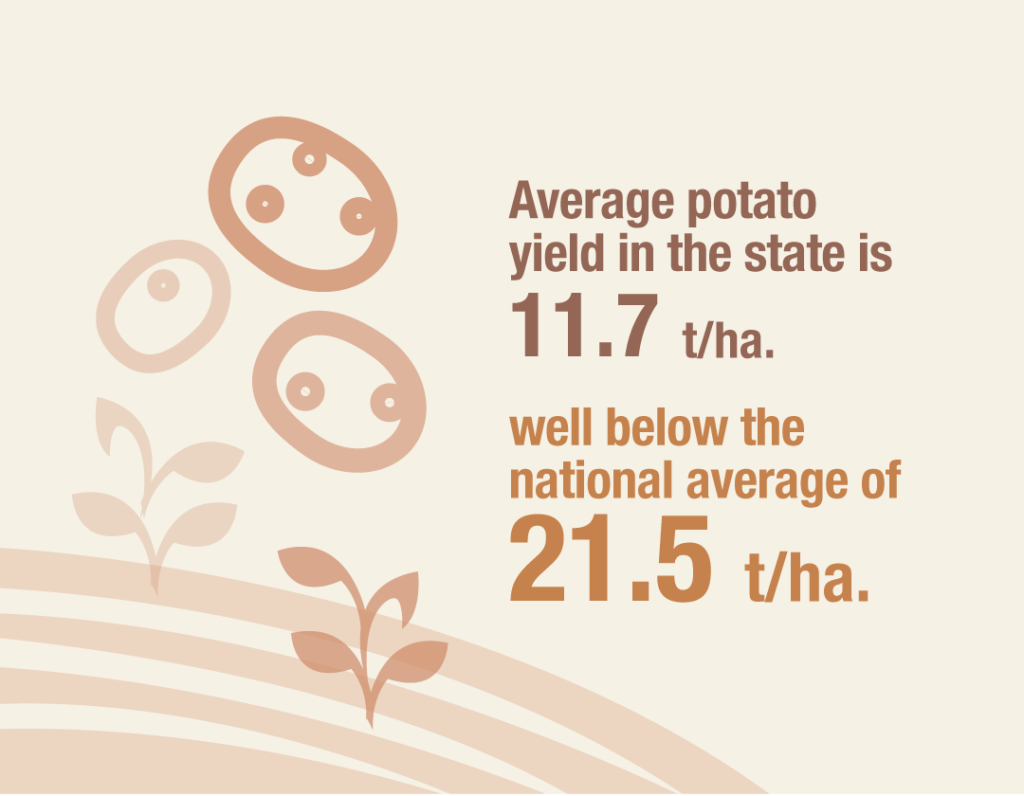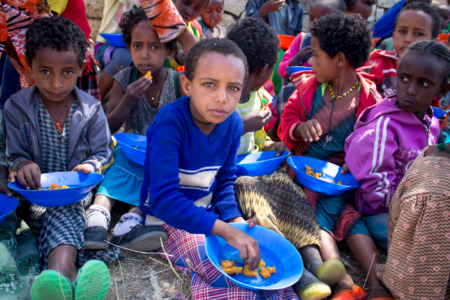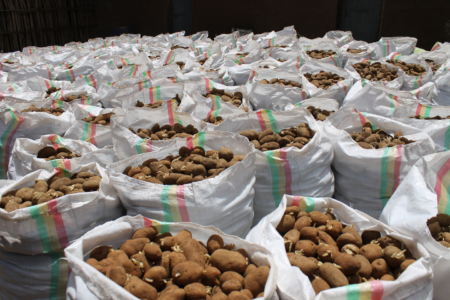
Jharkhand has great potential to boost potato production, making use of unused agricultural land. New varieties, land pooling, market linkages, farming synchronization, post-harvest technologies, and improved access to seed will improve the potato sector for farmers, consumers, and value chain actors alike.
Background
The state of Jharkhand has immense potential for crop diversification and intensification, including the introduction of potato into rice/wheat-based, rice/fallow, and mixed systems. Average potato yield in the state is 11.7 tons per hectare—well below the national average of 21.5 t/ha. An estimated 200,000 ha of upland paddy area could be used to grow potato and other crops. And another 1 million hectares could be converted into cultivable land.
Currently, farmers grow only table varieties of potato, but demand for processing varieties is likely to increase. The major constraint is shortages of quality seed and highyielding varieties. Other constraints on potato include inadequate storage, the high cost of seed, labor shortages, increasing wage rates, and poor market linkages.
Objectives
The project seeks to support the Jharkhand Tribal Development Council (JTDC) and the Government of Jharkhand to overcome underlying technological and social constraints facing the potato industry by improving the incomes of small-scale farmers in 14 tribal districts. This project is a part of the International Fund for Agricultural Development’s ‘Jharkhand tribal empowerment and livelihoods’ program. This project also seeks to provide employment in the potato sector, improve livelihoods and diversify food nutrition systems of poor farmers.
Approach
The project will select and introduce heat-tolerant and/or disease- and pest-resistant short-duration adapted potato varieties for both rabi and kharif seasons and disseminate them in the target areas. Varieties will come from the Central Potato Research Institute (CPRI) and the International Potato Center (CIP) as elite clones. Areas suitable for kharif potato production will be identified using GIS remote sensing and other methods. Early planting of potato will be promoted for rabi season where short-duration rice is also cultivated. Variety selection will take place through adaptation trials and gender-responsive participatory selection processes.
The project will develop a potato seed system for supplying quality seed of desired varieties produced locally by suitable technologies including mini-tubers, aeroponics, apical root cuttings, and temporary net houses. We will scout for areas with low aphid populations as these will be best suited for seed potato production.
The project aims to intensify potato cropping sustainably using mechanization, advanced integrated crop production methods, appropriate pest and disease management, and post-harvest reduction techniques. Scientists will prioritize integrated strategies to control pest and disease populations associated with farming intensification practices, favoring environmentally friendly methods to reduce pesticide use. Low-cost storage facilities will be built and demonstrated to enable farmers to avoid market saturation at harvest.
The ‘Small farmers, large field’ (SFLF) model enables smallholders to benefit from economies of scale by pooling their holdings into fields of 50–500 ha. By doing this and synchronizing activities, individual farmers benefit from lower unit costs for quality seed, seed storage, machinery use, inputs, and field operations. The SFLF approach will be tailored to the needs of the specific farmer groups involved, including gendered differences where appropriate.
Strong market linkages will be facilitated with processors and traders. The ‘participatory market chain approach’ will support market-oriented production strategies, profitable enterprise opportunities along the market chain, and employment generation for young people. This flexible approach will enable value chain actors to jointly identify, analyze, and benefit from potential business opportunities.
The project will develop gender-responsive training materials and train farmers and other value chain actors in improved production practices and marketing strategies. Exposure visits will be organized for administrators, scientists, farmers and other value chain actors to CPRI and other organizations in India, and to CIP programs in Bangladesh, Peru and Vietnam.
Expected outcomes
- Potato cultivation areas increased by 5,000 ha, and yields increased by 5 tons/ha on 20,000 ha—resulting in 125,000 tons of additional production.
- By 2022, at least 25,000 farmers cultivating potato using new technologies, earning an additional USD 400/ha.
- Water usage reduced by 20% by improved production practices.
- Improved potato planting materials produced locally both available and affordable.
- Farmers contracted by processing companies to sell their potato at higher prices.
- Farmer entrepreneurial capacities enhanced to commercialize new potato products and benefit from new market opportunities.
- Extension workers and farmers trained in best practices to reduce post-harvest losses, and low-cost potato harvesters introduced and promoted.

Key outputs
| Key outcomes | Targets |
| Early maturing, heat- and drought-tolerant potato varieties recommended for release in Jharkhand state | 5–7 |
| Demonstrations of improved varieties and management practices on farmer fields |
1,500 |
| Farmers trained in potato seed production technologies | 2,000 |
| Seed potato produced via aeroponics, apical root cuttings, and temporary net houses | 30% of state requirement |
| Seed value chain stakeholders trained in low-cost seed potato production techniques | 5,000 farmers access high-quality seed potatoes of improved varieties |
| Small farmer, large farm’ model—forward and backward linkages, improved management practices—demonstrated | 2,000 ha 3,000 farmers |
Contact
Umesh Singh
CIP, India
u.s.singh@cgiar.org
Thanks to our donors



